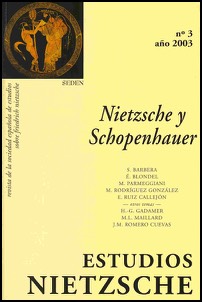Voluntad de vivir o voluntad de poder: Un episodio del debate de Nietzsche con Schopenhauer (1885-1889)
DOI:
https://doi.org/10.24310/EstudiosNIETen.vi3.9106Abstract
El interés que el joven Nietzsche había mostrado hacia las ideas schopenhauerianas sobre la estructura conflictual de la voluntad, no disminuye ni siquiera en el período en el que elabora la doctrina de la voluntad de poder. Algunos aspectos de la voluntad de Schopenhauer, y sobre todo la lucha entre las fuerzas como equilibrios de relaciones de hegemonía y resistencia, parecen haber estado en la base de la definición de la voluntad de poder como «Affekt des commandos» y como institución de una jerarquía (Rangordnung). Nietzsche busca separar los dos elementos que en Schopenhauer constituyen una unidad: el finalismo y el modelo conflictual de evolución de las fuerzas.
Downloads
Metrics
References
Müller-Lauter, W., «Nietzsches Lehre vom Willen zur Macht», Nietzsche-Studien, 3, 1974.
Schopenhauer, A., El mundo como voluntad y representación, vol. I, libro II, §27.
Schelling, F.W. J., Einleitung…, en Ausgewählte Schriften, ed. M. Frank, Suhrkamp, Frankfurt a. M., 1985.
Baeumler, Alfred, Nietzsche der Philosoph und Politiker, Leipzig: Reclam, 1931.
Heidegger, M., Nietzsche, Pfüllingen: Neske, 1961, vol. I.
Schopenhauer, A., Handschriftliche Nachlaß, ed. A. Hübscher, DTV, München, 1985, vol. I.
Broese, K., Schopenhauers Metaphysik des Willens als Metaphysik zwischen Kants Kritizismus und Nietzsches Radikalkritizismus, (Dissertation) Mainz, 2003.
Orsucci, A., Genealogia della morale. Introduzione alla lettura, Carocci, Roma, 2001, pp. 67-80.
Downloads
Published
How to Cite
Issue
Section
License
As of issue 21 (2021) this journal is published only in open access (diamond route).
From that number 21, like the previous numbers published in NIETZSCHE STUDIES, they are subject to the Creative Commons Acknowledgment-NoComercia-ShareIgual 4.0 license, the full text of which can be consulted at <http://creativecommons.org/licenses/by-nc-sa/4.0 >
It is the responsibility of the authors to obtain the necessary permissions of the images that are subject to copyright.
This work is licensed under a Creative Commons Attribution-NonCommercial-ShareAlike 4.0 International License.
Copyright generates two different rights: moral rights and patrimonial rights that EJFB recognizes and respects. Moral rights are those relating to the recognition of the authorship. They are rights of a personal nature that are perpetual, inalienable, unseizable and imprescriptible as consequence of the indivisible union of the author and his/her work.
Patrimonial rights are those that can be derived from the reproduction, distribution, adaptation or communication of the work, among others.







11.png)
